The Cowichan Climate Hub is a collaboration of local groups working in the Cowichan Valley to raise community awareness about the climate emergency and engage in collaborative conversations with our local communities and local governments and First Nations. We are part of a network of Climate Hubs throught the Climate Reality Project. Our goal is to work together locally to achieve solutions-focused climate action so no one is left behind.
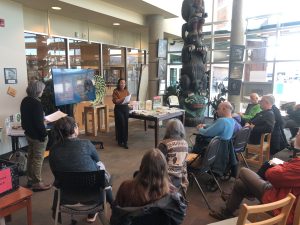 Our Climate Hub is made up of a diverse group of social benefit and environmental non-profits, faith groups, farmers, fishers, small businesses, schools, labour groups and others concerned about the climate emergency committed to engaging constructively with local people and our five local governments to move our communities toward solutions that make a difference. Climate change, and the increasing weather extremes it’s bringing our way, affect just about everything in our lives – food security, our water and watersheds, housing, our mental and physical health.
Our Climate Hub is made up of a diverse group of social benefit and environmental non-profits, faith groups, farmers, fishers, small businesses, schools, labour groups and others concerned about the climate emergency committed to engaging constructively with local people and our five local governments to move our communities toward solutions that make a difference. Climate change, and the increasing weather extremes it’s bringing our way, affect just about everything in our lives – food security, our water and watersheds, housing, our mental and physical health.
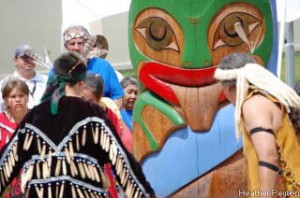 We recognize with gratitude and respect our location on the traditional and unceded territories of the Indigenous Peoples who have care for these lands and waters for generations over thousands of years, recognizing the Quw’utsun’, Malahat, Ts’uubaa-asatx, Halalt, Penelakut, Stz’uminus, Lyackson, Pauquachin, Ditidaht & Pacheedaht.
We recognize with gratitude and respect our location on the traditional and unceded territories of the Indigenous Peoples who have care for these lands and waters for generations over thousands of years, recognizing the Quw’utsun’, Malahat, Ts’uubaa-asatx, Halalt, Penelakut, Stz’uminus, Lyackson, Pauquachin, Ditidaht & Pacheedaht.
Transition Cowichan, one of our collaborative partner groups, a volunteer transition town initiative in the Cowichan Valley that has been working with diverse local groups to build local community resilience and ecological regeneration in response to the challenges and destabilizing impacts of the climate crisis while addressing issues of inequity and injustice since 2009, has kindly passed along their WordPress website framework to us, because of the values and goals we share, so we didn’t have to build it from scratch. We’re in that website rebuilding transition now. You can still find out what Transition Cowichan is up to at: https://www.facebook.com/TransitionCowichan or contact them at info@transitioncowichan.org
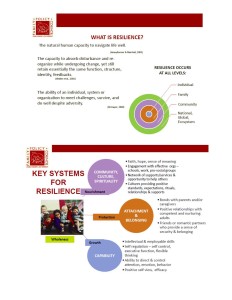 Community building is an important part of our work. We seek to bring together and work with individuals and existing community groups interested in local climate solutions, from engaging local governments on environmentally sound plans, policies and bylaws to working together directly on creating climate resilience through protecting local ecosystems and increasing local self-sufficiency in food, water, energy, business, emergency preparedness, and other vital aspects of life in response to the climate emergency. Together we believe we can make our Cowichan communities even healthier, more vibrant, equitable and sustainable places to work, play, and raise our children, while doing our best to ensure that no one in our community is left behind.
Community building is an important part of our work. We seek to bring together and work with individuals and existing community groups interested in local climate solutions, from engaging local governments on environmentally sound plans, policies and bylaws to working together directly on creating climate resilience through protecting local ecosystems and increasing local self-sufficiency in food, water, energy, business, emergency preparedness, and other vital aspects of life in response to the climate emergency. Together we believe we can make our Cowichan communities even healthier, more vibrant, equitable and sustainable places to work, play, and raise our children, while doing our best to ensure that no one in our community is left behind.
We’re also interested in new models for community transformation to reach our goals of community resilience and ecological regeneration. We will be shaped by those who participate, in whatever way you can.

 The science behind our increasingly destabilizing climate is clear. A rise in global temperature greater than 1.5 degrees Celsius above pre-industrial levels seems to now be upon us with potentially devastating impacts to human health and the earth’s ecosystems. We’re almost there, so we have no time to waste. Average global temperatures have already increased by close to 1.5 degrees C since 1900, mostly due to our burning of fossil fuels. We’re experiencing increasing extreme heat events, droughts, out-of-control forest fires, atmospheric rivers bringing more storms, floods and damaged public infrastructure. People here and around the world are suffering and at increasing risk. Business-and-resource-consumption-as-usual, including the continued expansion of fossil fuel extraction and emissions, is likely to add at least another destabilizing degree C before 2030 and exceeding 2 degrees C of warming above preindustrial levels, if we don’t act urgently and effectively.
The science behind our increasingly destabilizing climate is clear. A rise in global temperature greater than 1.5 degrees Celsius above pre-industrial levels seems to now be upon us with potentially devastating impacts to human health and the earth’s ecosystems. We’re almost there, so we have no time to waste. Average global temperatures have already increased by close to 1.5 degrees C since 1900, mostly due to our burning of fossil fuels. We’re experiencing increasing extreme heat events, droughts, out-of-control forest fires, atmospheric rivers bringing more storms, floods and damaged public infrastructure. People here and around the world are suffering and at increasing risk. Business-and-resource-consumption-as-usual, including the continued expansion of fossil fuel extraction and emissions, is likely to add at least another destabilizing degree C before 2030 and exceeding 2 degrees C of warming above preindustrial levels, if we don’t act urgently and effectively.
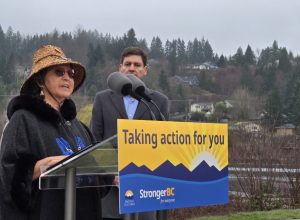 Our local governments are responding with action consistent with updated Official Community Plans and passing building bylaws that will replace fossil fuels with electricity, including heat pumps that will both heat and cool new homes and other building, as of this July 2024. Summer drought and water stress are things we know all too well here in the Cowichan, and the provincial government has now committed to step up and partner with the federal government to fund the new weir at Cowichan Lake for critical water storage essential for our communities and to protect our salmon and
Our local governments are responding with action consistent with updated Official Community Plans and passing building bylaws that will replace fossil fuels with electricity, including heat pumps that will both heat and cool new homes and other building, as of this July 2024. Summer drought and water stress are things we know all too well here in the Cowichan, and the provincial government has now committed to step up and partner with the federal government to fund the new weir at Cowichan Lake for critical water storage essential for our communities and to protect our salmon and 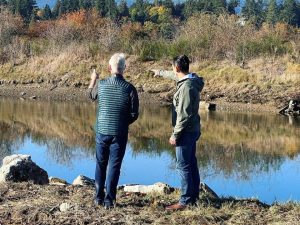 other aquatic life. At the Cowichan Estuary the Nature Trust and Cowichan Tribes are restoring the ecosystem and its eelgrass meadows to protect salmon habitat and migratory bird habitat where the Cowichan River meets the sea in the face of our changing climate, just as Official Community Plans are protecting farmland by containing development within urban containment boundaries.
other aquatic life. At the Cowichan Estuary the Nature Trust and Cowichan Tribes are restoring the ecosystem and its eelgrass meadows to protect salmon habitat and migratory bird habitat where the Cowichan River meets the sea in the face of our changing climate, just as Official Community Plans are protecting farmland by containing development within urban containment boundaries.
There are solutions, and there is much more work to do.
The good news is – there is much that we can do together here on a local level – both to reduce emissions and to adapt and build resilience in the face of the climate impacts that are already here!
Are you a local social benefit or environmental non-profit, faith group, farmer, fisher, small business, school or school group, labour group or other group concerned about the climate emergency interested in working with us on collaborative climate solutions? Are you an individual or family wanting to keep in touch about the work we are doing. Contact us at cowichan@climatehub.ca
 Fossil Fuels While we can continue to use oil to make things that are not burned and released into the atmosphere – aspirin, electric sockets, plastics, computers etc. – burning fossil fuels is destabilizing our climate.
Fossil Fuels While we can continue to use oil to make things that are not burned and released into the atmosphere – aspirin, electric sockets, plastics, computers etc. – burning fossil fuels is destabilizing our climate.
Senior Fellow at the Post Carbon Institute Richard Heinberg says, “Our central survival task for the decades ahead, as individuals and as a species, is to make a transition away from the burning of fossil fuels – and to do this as peacefully, equitably, and intelligently as possible”. This means as a community we need to work together to create and use alternatives.
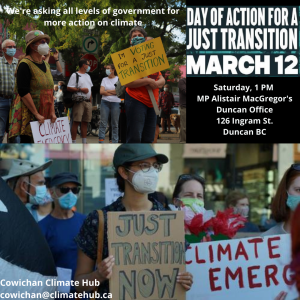 We are also bumping up against the limits of our finite planet at the same time as the wealthiest 1% own, control and use so much of the world’s resources. We need to address inequity and economic instability within our communities and globally, alongside climate impacts. This means working together toward a shift from resource extraction for profit to a sustainable, renewable, equitable and largely local economy where we cooperate together so no one is left behind. To learn more about why we need to let go of the “economic growth” paradigm of pursuing growth for growth’s sake, and focus on building local and regional resilience to address the climate crisis, as well as on reducing the gap between the those who have unlimited access to resources and those who don’t have enough to get by, check out Asher Miller and Richard Heinberg’s 2023 very readable paper, “Welcome to the Great Unraveling: Navigating the Polycrisis of Environmental and Social Breakdown” which seeks to build a coherent narrative about the roots of the polycrisis, the signs of its arrival and evolution, and why we should be thinking differently about the future. Not as grim as the title sounds and worth a conversation.
We are also bumping up against the limits of our finite planet at the same time as the wealthiest 1% own, control and use so much of the world’s resources. We need to address inequity and economic instability within our communities and globally, alongside climate impacts. This means working together toward a shift from resource extraction for profit to a sustainable, renewable, equitable and largely local economy where we cooperate together so no one is left behind. To learn more about why we need to let go of the “economic growth” paradigm of pursuing growth for growth’s sake, and focus on building local and regional resilience to address the climate crisis, as well as on reducing the gap between the those who have unlimited access to resources and those who don’t have enough to get by, check out Asher Miller and Richard Heinberg’s 2023 very readable paper, “Welcome to the Great Unraveling: Navigating the Polycrisis of Environmental and Social Breakdown” which seeks to build a coherent narrative about the roots of the polycrisis, the signs of its arrival and evolution, and why we should be thinking differently about the future. Not as grim as the title sounds and worth a conversation.
In addressing the challenges we face it’s also worth considering “How might our response to climate change look more like a potluck, a barn-raising or a party than a protest march?” We can find ways to create richer, more vibrant and connected communities through cooperation and the re-localization of food production, and the other services and resources we need to survive and thrive in a world increasingly challenged by climate change.
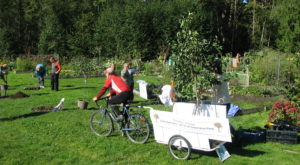 By working with people and community groups in the Cowichan region we can create deeper and richer vision of the sustainable, stable local communities that meets our needs and, looking back from that vision of the future, we will plan and work to get there.
By working with people and community groups in the Cowichan region we can create deeper and richer vision of the sustainable, stable local communities that meets our needs and, looking back from that vision of the future, we will plan and work to get there.
One example is the work of Cowichan Green Community which has been focusing on environmental sustainability and food security in the Cowichan Region since 2004. The Duncan Farmers Market and our local Cow-Op link producers and consumers of local food year round. The Cowichan Bio-diesel Cooperative is an example of re-localizing our transportation system, and Viridian Solar Coop, has installed over 6.62MW of power (18,000+ solar panels) in the Cowichan Valley, on Vancouver Island and the Gulf Islands since they began as a worker-owned coop in 2012. supporting increased energy self-sufficiency.
In a changing climate:
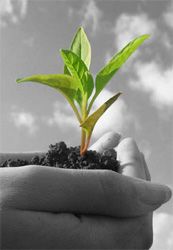
- It is better to plan and be prepared, than be taken by surprise;
- We need to act together and we need to act now;
- This will require all our skill, ingenuity, intelligence and good will;
- Solutions are possible and must creatively engage the head, the heart and the hands; and, by unleashing the collective genius within our local communities, we can build ways of living that are more connected, healthy and enriching, and that also recognize the biological limits of our place and our planet.
There are many places to get involved, to bring your ideas and insights to the work we need to do together, and pitch in and help create a viable and sustainable future for ourselves, our children, and our children’s children, getting connected to each other in community and having fun along the way. Contact us if you’d like to be on our email list for updates: cowichan@climatehub.ca
